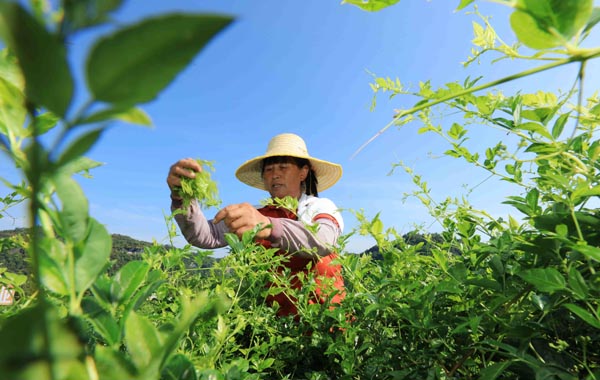Village prospers through vine tea cultivation


CHANGSHA — Displaying a tea caddy in front of the smartphone, Li Chunyan enthusiastically introduces the special "vine tea" grown in the Wuling Mountains, to promote sales of the infusion online.
Vine tea, or Ampelopsis grossedentata, is a medicinal plant, and locals call it meicha. "We, Tujia people, affectionately refer to it as 'Tujia divine tea', since it has both nutritional and medicinal properties," says Li, a local of Qing'an village in Zhangjiajie, a renowned tourist city in Central China's Hunan province.
"In addition to lucid water and lush mountains, Zhangjiajie is also known for its unique agricultural goods, like this snow-white vine tea in my hand," Li explains to the audience.
Over 10 years ago, Li and her husband both quit their jobs in more developed coastal areas to start a new business in their hometown. In 2015, the couple started to develop a vine tea base.
"We sowed 12 mu (about 0.8 hectares) the first year, and to our surprise, we earned over 100,000 yuan ($14,800)," says Li.
Later, they established a company and encouraged other villagers to plant the tea as well, gradually increasing the scope of their operation each year.
Li says that her company's sales topped 20 million yuan in 2022, and more than 300 households in Qing'an village now grow vine tea.
"I buy fresh leaves directly from the villagers, so they do not have to worry about sales. When it's the leaf-picking season, everyone can help pick leaves and make some extra cash without leaving their homes," Li says.
"I used to plant corn and peanuts, and could barely make ends meet. With the growth of the vine tea industry in the village, I can now earn money not only by picking tea leaves, but also by planting them," says Hu Guoying, a Qing'an villager.
"Now, I have some savings, and my family recently moved into a new house," says Hu.
"Vine tea is now the dominant industry in Yongding district (where the village is located), playing a vital role in consolidating and expanding poverty alleviation and in promoting rural vitalization," says Tian Liping, the secretary-general of the Zhangjiajie vine tea association.
According to Wang Xuejun, head of Yongding district, the locale has become a major production base of vine tea, hiring over 90,000 people and boasting an annual turnover of 2.2 billion yuan.
"We will continue to accelerate scientific and technological innovation, build brands and expand the market to pursue high-quality development of the vine tea industry," says Wang.

































